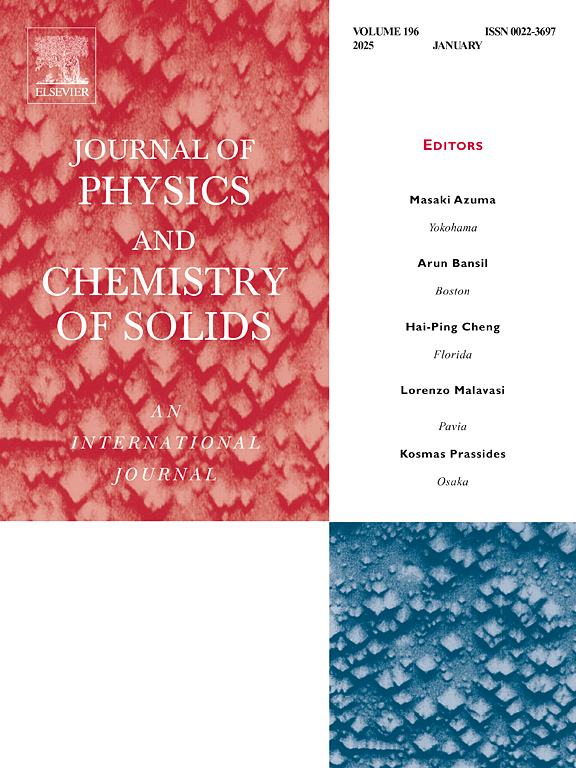使用碳纳米管作为背表面场层增强钾长石太阳能电池的性能
IF 4.9
3区 材料科学
Q2 CHEMISTRY, MULTIDISCIPLINARY
引用次数: 0
摘要
我们研究并优化了 CZTSSe 薄膜太阳能电池的新设计结构,将单壁碳纳米管 (SWCNT) 作为背表面场层。在这项研究中,太阳能电池电容模拟器--一维(SCAPS-1D)模拟器用于研究在基本的 AZnO/i-ZnO/n-CdS/CZTSSe/Mo 结构器件中加入碳纳米管背表面场(BSF)层,从而提高 CZTSSe 太阳能电池的性能。通过检查不同的光电特性,如吸收体和 BSF 层的厚度,以及块体和界面缺陷密度,对电池性能进行了模拟研究。结果表明,仔细优化这些参数可以显著提高光伏性能。具体而言,当使用 SWCNT 作为 BSF 层时,输出参数有明显改善:开路电压 (VOC) 为 0.81632 V,短路电流密度 (JSC) 为 46.87 mA/cm2,填充因子 (FF) 为 76.38 %,效率 (PCE) 为 29.20 %。这种新型的 SWCNT 应用大大降低了重组损耗,从而改善了太阳能电池中的载流子收集并提高了效率。模拟结果进一步证明,使用 SWCNT 材料作为 BSF 层可以制造出廉价、高效的基于 CZTSSe 的薄膜太阳能电池。本文章由计算机程序翻译,如有差异,请以英文原文为准。
Enhancement of kesterite solar cells using a carbon nanotube as a back surface field layer
We investigated and optimized a new design structure for CZTSSe thin film solar cells, incorporating a single-walled carbon nanotube (SWCNT) as the back surface field layer. This technique enhances efficiency by minimizing carrier recombination at the device's back surface and enhancing the collection of photo-generated carriers.
In this study, the Solar Cell Capacitance Simulator - One Dimension (SCAPS-1D) simulator was used to investigate the enhancement of the performance of CZTSSe-based solar cells by incorporating a carbon nanotube back surface field (BSF) layer in the basic AZnO/i-ZnO/n-CdS/CZTSSe/Mo structure device. The cell performance simulations were studied by examining the different optoelectronic properties, such as the thickness of the absorber and the BSF layer, and the bulk and interface defect densities. The results demonstrate that carefully optimizing these parameters can significantly enhance photovoltaic performance. Specifically, the output parameters showed marked improvements: an open circuit voltage (VOC) of 0.81632 V, a short circuit current density (JSC) of 46.87 mA/cm2, a fill factor (FF) of 76.38 %, and an efficiency (PCE) of 29.20 % when SWCNT was used as the BSF layer. This novel application of SWCNTs significantly reduces recombination losses, leading to improved carrier collection and enhanced efficiency in solar cells. The simulation results further demonstrate that using SWCNT material as a BSF layer could enable the fabrication of inexpensive and highly efficient CZTSSe-based thin-film solar cells.
求助全文
通过发布文献求助,成功后即可免费获取论文全文。
去求助
来源期刊
CiteScore
7.80
自引率
2.50%
发文量
605
审稿时长
40 days
期刊介绍:
The Journal of Physics and Chemistry of Solids is a well-established international medium for publication of archival research in condensed matter and materials sciences. Areas of interest broadly include experimental and theoretical research on electronic, magnetic, spectroscopic and structural properties as well as the statistical mechanics and thermodynamics of materials. The focus is on gaining physical and chemical insight into the properties and potential applications of condensed matter systems.
Within the broad scope of the journal, beyond regular contributions, the editors have identified submissions in the following areas of physics and chemistry of solids to be of special current interest to the journal:
Low-dimensional systems
Exotic states of quantum electron matter including topological phases
Energy conversion and storage
Interfaces, nanoparticles and catalysts.

 求助内容:
求助内容: 应助结果提醒方式:
应助结果提醒方式:


